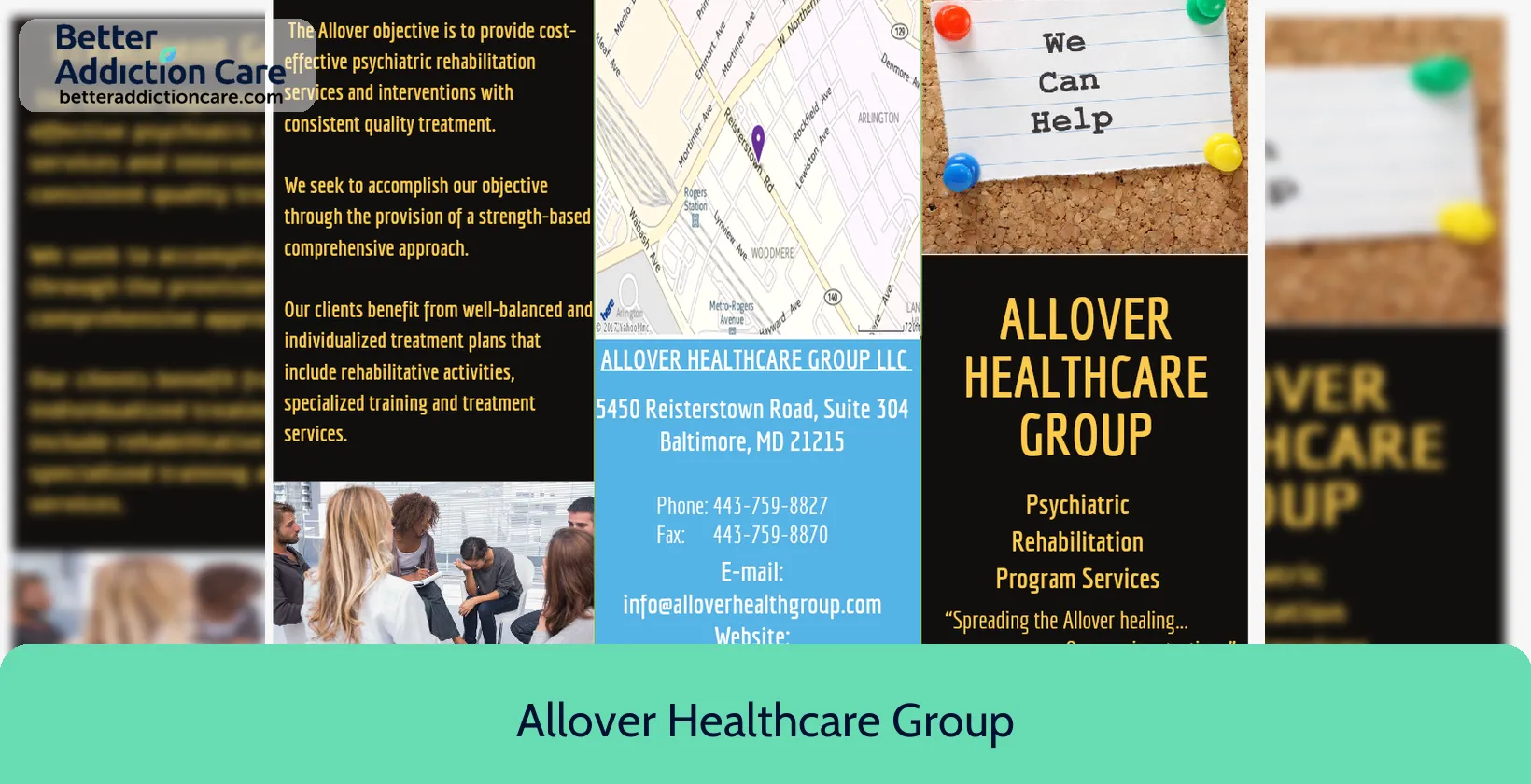Allover Healthcare Group
Overview
Allover Healthcare Group is a substance abuse treatment center for people seeking treatment near Baltimore City County. As part of their treatment modalities for recovery, Allover Healthcare Group provides cognitive behavioral therapy, telemedicine/telehealth therapy, and substance use disorder counseling during treatment. Allover Healthcare Group is located in Baltimore, Maryland, accepting cash or self-payment for treatment.
Allover Healthcare Group at a Glance
Payment Options
- Cash or self-payment
- Medicaid
- Medicare
- State-financed health insurance plan other than Medicaid
- Private health insurance
Assessments
- Screening for tobacco use
- Comprehensive mental health assessment
- Comprehensive substance use assessment
- Interim services for clients
- Outreach to persons in the community
Age Groups
- Seniors or older adults
- Adolescents
- Young adults
- Children/adolescents
- Seniors
Ancillary Services
- Case management service
- Suicide prevention services
- Specially designed program for DUI/DWI clients
- Child care for client's children
- Domestic violence services, including family or partner
Highlights About Allover Healthcare Group
7.11/10
With an overall rating of 7.11/10, this facility has following balanced range of services. Alcohol Rehabilitation: 8.00/10, Drug Rehab and Detox: 6.62/10, Insurance and Payments: 6.00/10, Treatment Options: 7.82/10.-
Alcohol Rehabilitation 8.00
-
Treatment Options 7.82
-
Drug Rehab and Detox 6.62
-
Insurance and Payments 6.00
Accreditations
State mental health department:
State mental health department accreditation refers to the process of evaluating and certifying the quality and standards of a state's mental health department, ensuring that it provides high-quality services and meets specific criteria for mental health care. The accreditation process is performed by a third-party organization and helps to improve the overall care and treatment of individuals with mental health conditions.
State department of health:

Government agencies issue State Licenses, granting permission to rehabilitation organizations to conduct their business operations lawfully within specific geographic regions. Generally, the particular rehabilitation programs offered by a facility and its physical location dictate the necessary licenses needed for legal operation.
Commission on Accreditation of Rehabilitation Facilities (CARF):

CARF accreditation is a prestigious recognition for rehabilitation and human service organizations. It signifies that an organization meets high-quality standards and is committed to providing top-level care. CARF conducts rigorous evaluations to ensure compliance, enhancing an organization's credibility and reassuring clients and funders of exceptional service quality. This accreditation promotes excellence and continual improvement in the rehabilitation and human services field.
Treatment At Allover Healthcare Group
Treatment Conditions
- Mental health treatment
- Alcoholism
- Substance use treatment
- Co-occurring Disorders
Care Levels
- Outpatient
- Outpatient day treatment or partial hospitalization
- Intensive outpatient treatment
- Regular outpatient treatment
- Aftercare
Treatment Modalities
- Cognitive behavioral therapy
- Telemedicine/telehealth therapy
- Substance use disorder counseling
- Trauma-related counseling
- Smoking/vaping/tobacco cessation counseling
Ancillary Services
Additional Services
- Pharmacotherapies administered during treatment
- Mentoring/peer support
- Breathalyzer or blood alcohol testing
Special Programs
- Clients with co-occurring mental and substance use disorders
- Veterans
- Active duty military
- Members of military families
- Criminal justice (other than DUI/DWI)/Forensic clients
Get Help Now
Common Questions About Allover Healthcare Group
Contact Information
Other Facilities in Baltimore

7.29

6.91

6.91

6.53

6.68

6.77

6.62

6.65
DISCLAIMER: The facility name, logo and brand are the property and registered trademarks of Change Health Systems, and are being used for identification and informational purposes only. Use of these names, logos and brands shall not imply endorsement. BetterAddictionCare.com is not affiliated with or sponsored by Change Health Systems.

